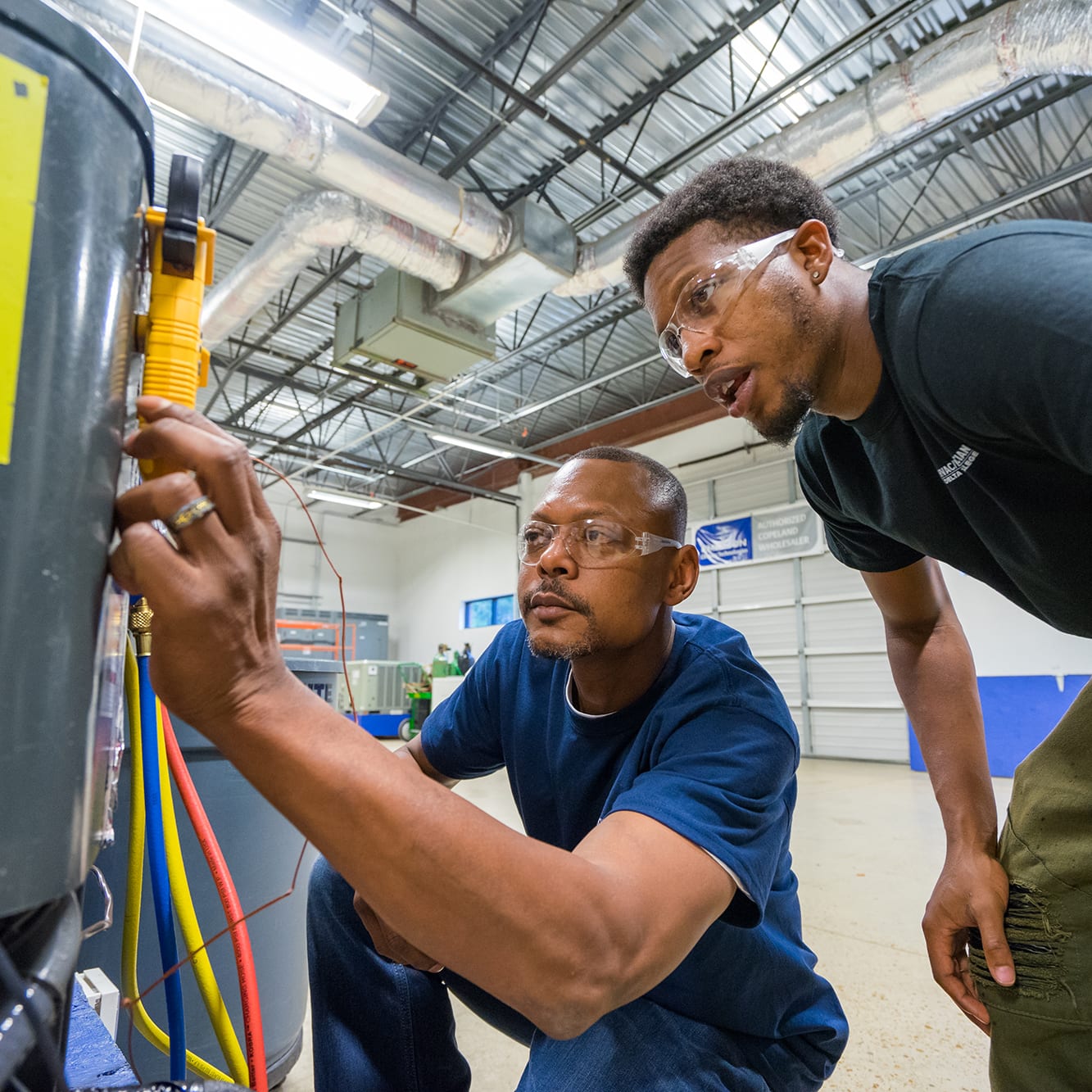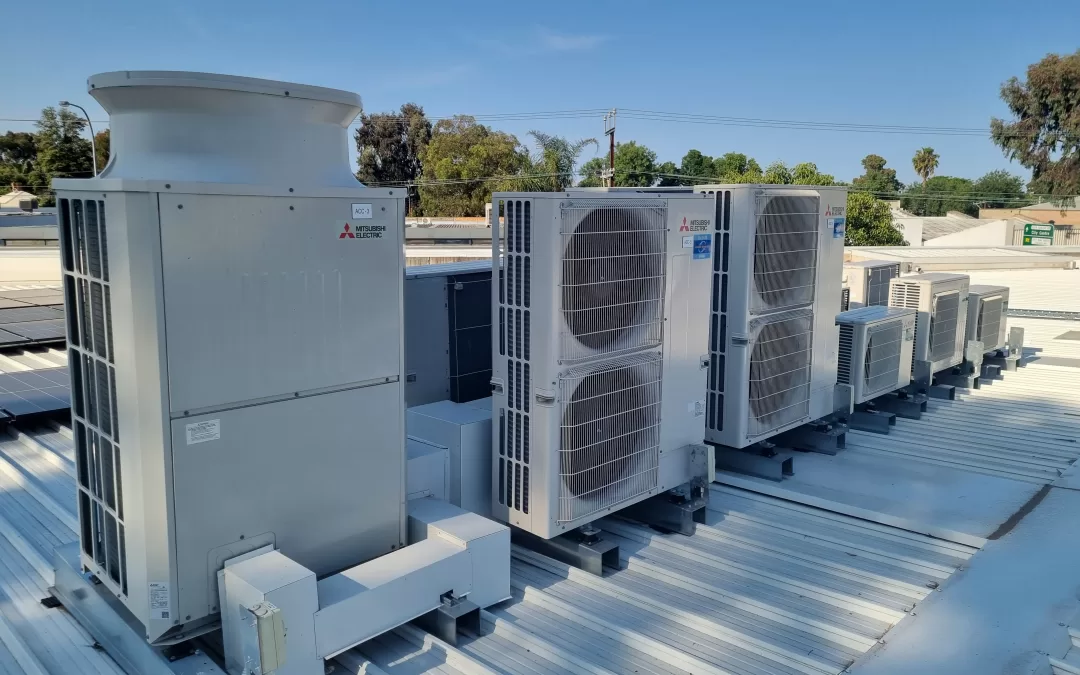Discovering the Crucial Components of an Effective A/c System
An effective a/c system is improved several vital components that function in consistency. Each component, from the thermostat to the ductwork, plays a necessary role in keeping convenience and energy effectiveness. Understanding these elements is vital for enhancing performance and enhancing interior air high quality. As one examines these elements, the intricate partnerships between them reveal understandings right into improving general system effectiveness. What particular aspects contribute most to this efficiency?
The Role of the Thermostat in Heating And Cooling Performance

Typically neglected, the thermostat plays an essential role in the effectiveness of Cooling and heating systems. This tiny tool acts as the key control center, controling temperature settings and guaranteeing suitable comfort within a space. By properly picking up the ambient temperature, the thermostat communicates with the home heating, ventilation, and air conditioning units to keep the wanted climate
An effective thermostat decreases power consumption by triggering the HVAC system just when needed, consequently preventing too much home heating or cooling. Modern smart and programmable thermostats enhance this efficiency better by permitting users to set timetables and from another location adjust setups, adapting to daily routines.
Furthermore, the placement of the thermostat is crucial; improper place can lead to inaccurate temperature readings, resulting in inefficient procedure. In general, a well-functioning thermostat not just improves comfort however additionally adds significantly to power savings and the durability of the a/c system.
Recognizing the Relevance of Air Filters
Air filters offer a crucial feature in cooling and heating systems by assuring that the air distributing within a room continues to be healthy and balanced and clean. These filters catch dirt, irritants, and various other contaminants, preventing them from being recirculated throughout the environment. By catching these particles, air filters add to enhanced interior air top quality, which can substantially profit passengers' health, particularly those with allergies or respiratory system conditions.
Furthermore, keeping clean air filters enhances the effectiveness of HVAC systems. Stopped up filters can restrict airflow, triggering the system to function harder to preserve preferred temperatures, bring about raised power intake and higher utility bills. Regularly changing or cleaning up filters is an essential maintenance step that can lengthen the life-span of a/c tools. Eventually, recognizing the importance of air filters enables house owners and building supervisors to take positive steps to guarantee a well-functioning, reliable HVAC system that advertises a secure and comfortable interior atmosphere.

The Functionality of the Heater and Heat Pump
Heaters and warm pumps are essential parts of a/c systems, in charge of giving heat during colder months. Heaters run by heating air through combustion or electrical resistance, after that distributing it throughout the home via ducts. They typically offer rapid home heating and can be fueled by all-natural gas, electrical energy, or oil, depending on the system kind.
Alternatively, heat pumps move warmth as opposed to create it. They draw out warmth from the outside air or ground, even in reduced temperature levels, and transfer it inside your home. HVAC experts. This double capability allows heat pumps to likewise provide cooling in warmer months, making them versatile alternatives for year-round environment control
Both systems require correct upkeep to guarantee effectiveness and durability. While furnaces succeed in extreme cold, heatpump can be advantageous in modest climates. Comprehending their distinctive performances help home owners in picking one of the most suitable choice for their home heating needs.
Discovering the Cooling System
The a/c unit is an essential component of a/c systems, offered in various kinds to suit different demands. Understanding the performance ratings of these devices is important for making notified options regarding energy usage and price. This area will certainly discover the diverse kinds of a/c and clarify exactly how efficiency rankings impact performance.
Kinds Of Air Conditioners
While various elements affect the selection of a/c systems, understanding the different types offered is essential for homeowners and structure supervisors alike. Central air conditioning conditioners are designed to cool down entire homes or structures, utilizing a network of air ducts for air movement. Home window systems use an click here for info even more local service, suitable for tiny spaces or single spaces. Portable ac unit supply versatility, permitting customers to move the unit as needed. Ductless mini-split systems are another choice, combining the performance of main systems with the ease of zoning, as they require no ductwork. Finally, geothermal systems harness the planet's temperature level for energy-efficient cooling. Each type features unique benefits, making educated options necessary for efficient climate control.

Effectiveness Rankings Clarified
Understanding efficiency rankings is essential for picking the ideal a/c unit, as these metrics give insight right into the system's performance and power usage. One of the most typical rating for air conditioners is the Seasonal Power Effectiveness Proportion (SEER), which determines the cooling output throughout a typical air conditioning period divided by the complete electrical energy input. A higher SEER suggests better performance. In addition, the Power Efficiency Ratio (EER) is used for gauging effectiveness under particular problems. One more vital metric is the Energy Celebrity qualification, which indicates that an unit fulfills stringent power efficiency standards. By evaluating these rankings, consumers can make informed selections that not only enhance convenience but additionally minimize power expenses and ecological impact.
The Value of Ductwork and Air movement
Efficient ductwork design and airflow management play crucial functions in the total performance and efficiency of a/c systems. Correct ductwork guarantees that conditioned air is dispersed evenly throughout an area, decreasing temperature fluctuations and boosting convenience. Properly designed air ducts reduce resistance to airflow, decreasing the workload on cooling and heating tools and eventually lowering power usage.
Air movement administration entails strategically positioning vents and registers to boost the circulation of air. This prevents common concerns such as hot or chilly areas, which can occur when air flow is blocked or improperly balanced. Additionally, the ideal duct products and insulation can better improve effectiveness by lowering heat loss or gain during air transit.
An effective ductwork system not only adds to energy financial savings however can likewise extend the life-span of HVAC equipment by reducing unnecessary strain (HVAC experts). Consequently, understanding the importance of ductwork and airflow is necessary for achieving peak heating and cooling system performance
Normal Maintenance Practices to Boost Performance
Regular upkeep practices are important for making certain peak efficiency of cooling and heating systems. These techniques consist of regular evaluations, cleansing, and required repair services to keep the system running effectively. Regularly Get More Information transforming air filters is essential, as stopped up filters can block air movement and decrease efficiency. Furthermore, professionals must check and tidy evaporator and condenser coils to avoid overheating and energy wastefulness.
Yearly expert examinations are likewise advised, as skilled technicians can recognize possible concerns before they rise. Lubing moving components minimizes damage, adding to a longer life-span for the system. In addition, making sure that the thermostat functions correctly help in keeping ideal temperature level control.

Often Asked Concerns
Exactly how Typically Should I Change My Thermostat?
Thermostats should typically be changed every 5 to ten years, depending on usage and innovation advancements. Regular checks are advisable to ensure peak efficiency, particularly if experiencing inconsistent temperature level he has a good point control or boosted energy costs.
What Size Air Filter Is Best for My Heating And Cooling System?
The very best dimension air filter for a heating and cooling system differs by unit style. Commonly, it's important to consult the owner's guidebook or inspect the existing filter measurements to guarantee peak performance and air high quality.
Can I Install a Heatpump Myself?
Setting up a heat pump independently is feasible for proficient individuals, however it calls for knowledge of regional codes and electrical systems. Working with a specialist is recommended to guarantee proper installment and excellent system efficiency.
Just how Do I Know if My Ductwork Is Effective?
To figure out ductwork performance, one must look for leakages, measure air flow at vents, inspect insulation high quality, and assess temperature level differences between supply and return air ducts. Professional evaluations can give detailed insights right into total efficiency.
What Are Indications My A/c Requirements Immediate Maintenance?
Indicators that an a/c system requires instant upkeep include unusual sounds, inconsistent temperatures, enhanced energy bills, unpleasant odors, and frequent cycling. Addressing these concerns immediately can prevent more damage and warranty top system efficiency.
Air filters serve an important function in Heating and cooling systems by guaranteeing that the air flowing within an area remains tidy and healthy. In addition, preserving clean air filters enhances the effectiveness of A/c systems. Ductless mini-split systems are another option, integrating the performance of main systems with the convenience of zoning, as they call for no ductwork. Comprehending efficiency scores is essential for choosing the appropriate air conditioning unit, as these metrics supply understanding into the system's efficiency and energy usage. The ideal size air filter for an A/c system differs by unit style.